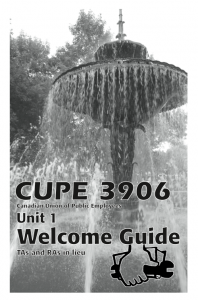The nation-wide Canada Post lockout will affect the processing and delivery of your benefits in a variety of ways. Please read the following post carefully.
Equitable Life will continue to process Unit 1 (TA and RA in lieu) and Unit 3 (Post-doc) dental claims. The Prosure group will continue to process Unit 2 benefit claims and Unit 1 childcare. Both Equitable Life and Prosure have agreed to send benefits cheques to CUPE 3906 via courier. These cheques can be picked up at the CUPE 3906 office in the basement of Wentworth Hall.
We will try to notify members by email if a cheque is available for pick up. Members who are expecting a cheque are encouraged to email their up to date contact info to the benefits officer, Rebecca Strung, at benefits@cupe3906.org.
The Canadian Union of Postal Workers has indicated that there is a lot of mail in the system that will not be delivered. This means that benefits claims might be held up on route to Equitable life or Prosure. It also means that benefits cheques that were already mailed out may be stuck in the system. Members who recently submitted a claim should thus expect long delays. Inquiries about the status of a benefits claim should be directed to the benefits officer at benefits@cupe3906.org.
Please note that Unit 1 vision care and UHIP claims are being held until the end of August and will not be affected by the Canada Post lockout. Click here for more information.
Please feel free to contact Rebecca at benefits@cupe3906.org or the CUPE office if you have any questions or concerns about how the Canada Post lockout will affect your benefits.
 A huge welcome goes out to all our new members as we start a new school year.
A huge welcome goes out to all our new members as we start a new school year.

 Annual Labour Day celebrations, organized by the Hamilton District Labour Council, will take place this year on September 5th. There will be a parade followed by a picnic in Dundurn Park.
Annual Labour Day celebrations, organized by the Hamilton District Labour Council, will take place this year on September 5th. There will be a parade followed by a picnic in Dundurn Park.



 There will be a Special General Membership Meeting to discuss, and vote on, priorities that will inform our proposals for the upcoming round of negotiations with the University. Your contract will expire at the end of August, and your involvement in the process of bargaining a new one is essential to the process.
There will be a Special General Membership Meeting to discuss, and vote on, priorities that will inform our proposals for the upcoming round of negotiations with the University. Your contract will expire at the end of August, and your involvement in the process of bargaining a new one is essential to the process.